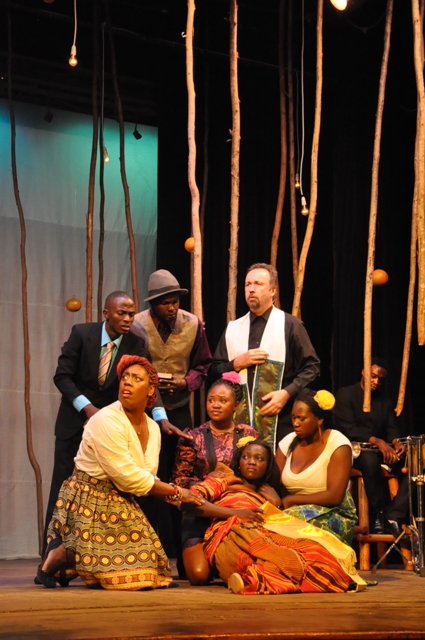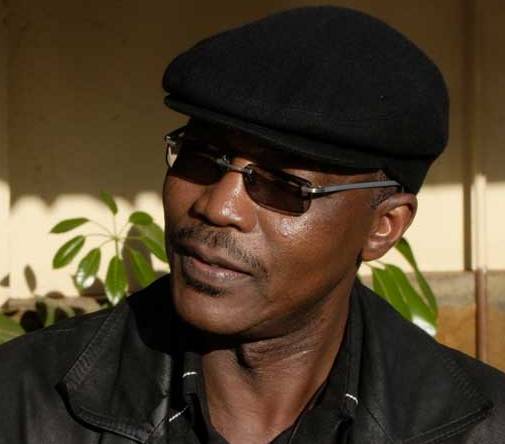By Bamuturaki Musinguzi
Published November 8, 2014
 When William Shakespeare, the legendary English playwright, penned one of English-speaking world’s most famous romantic comedy, Much Ado About Nothing, more than 400 years ago, he attempted to dramatise that problem inherent in social class power structures, especially that of men who mistreat and dishonour women for their own self-aggrandisement.
When William Shakespeare, the legendary English playwright, penned one of English-speaking world’s most famous romantic comedy, Much Ado About Nothing, more than 400 years ago, he attempted to dramatise that problem inherent in social class power structures, especially that of men who mistreat and dishonour women for their own self-aggrandisement.
RELATED: Leading Malawian Actress to Work Across Africa
And it is this drama revolving around gender roles and the differences between men and women in society that was brought to the National Theatre in the Ugandan capital by Kampala Amateur Dramatics Society (KADS) in partnership with UK-based Les Foules Theatre Company October 2 – 5, 2014.
The play, that depicts the social and economic issues of 17th century Europe revolving around two very different sets of lovers–Beatrice and Benedick and Claudio and Hero–was directed by Peter Wiedmann and Nathalie Adlam of Les Foules with a predominantly Ugandan cast and featured modern dress, music, dance and staging techniques.
RELATED: Maasai Dancer’s Journey Into The Future And The Past
The play opened with Don Pedro (played by Samuel Lutaaya), Benedick (Brian Emurwon) and the young gentleman Claudio (Douglas Sebamala) returning from a successful military campaign and visiting the house of Leonato (Chris Carruthers), an ageing gentleman.
In the play, Claudio immediately falls in love with Hero (Gladys Oyenbot), Leonato’s daughter. Benedick and Beatrice (Giselle Gant) argue, as usual. Benedick, who is opposed to marriage, tries to discourage Claudio, but Don Pedro encourages Claudio and promises to help him with his courtship.
Meanwhile the embittered and unhappy Don John (Vinnie Payne), Don Pedro’s younger half-brother, decides to try to prevent the marriage, and enlists the support of his servant Borachio (Yusuf Kaija) and his mistress Conrada (Terry Ombaka).
Don Pedro successfully brokers the marriage of Claudio and Hero and then decides to try to match-make Benedick and Beatrice. Don Pedro, Leonato and Claudio trick Benedick into thinking that Beatrice loves him, while Hero and her cousin Ursula (Diana Kahunde) play a similar trick on Beatrice.
RELATED: Women’s Month 2012 Art Exhibition Closes in Kampala
On the night before Claudio and Hero’s wedding, Don John invites Claudio and Don Pedro to come and witness Hero’s apparent infidelity. In fact, Don John’s servant, Borachio, has arranged to meet Hero’s servant Margaret (Flora Aduk), but Claudio and Don Pedro are convinced that Borachio is meeting Hero. Convinced of Hero’s infidelity, the next day, at the wedding, Claudio rejects Hero and disgraces her in front of the wedding guests. Hero is devastated and her father Leonato is horrified, and publicly disowns her.
However, the priest, Friar Francis (Tom Adlam), persuades Leonato that she is innocent and develops a plan designed to convince Claudio that Hero has died of shock and distress from Claudio’s humiliation of her. Don John, fearing that his treachery will be discovered, runs away.
Prompted by the day’s distressing events, Benedick and Beatrice confess their love for each other. Then, Beatrice then asks Benedick to fight Claudio as proof of his love, because he has humiliated her sister. Benedick is horrified and at first denies her request, but then agrees. Leonato and his brother Antonio (Jackson Otim) blame Claudio for Hero’s apparent death and challenge him to a duel. Benedick then does the same.
Though Don John has fled the city, a force is sent to capture him. Claudio, stricken with remorse that he has wrongly accused Hero, agrees to her Leonato’s demand that he marry Antonio’s daughter, “almost the copy of my child that’s dead†and thereby make good his promises. Claudio agrees.
At the wedding the following day, the bride is revealed to be Hero, still living. Claudio is overjoyed. Beatrice and Benedick, prompted by their friends’ interference, finally and publicly announce their love for each other and agree to marry. The two weddings are celebrated with music and laughter.
Adults who parted with Sh20 000 (about US$7.3) and students Sh15 000 (US$5.5) were treated to the production conveyed in Shakespeare’s undisputed enjoyable mastery of the English language full of imagery, poetry and prose. Every major character plays about with, or misuses language. Benedick and Beatrice, are good at their witty verbal spats.
RELATED: Underwear Exhibitionism Reigns in Urban Africa
The main themes of the play that was first printed in 1600 are disbelief, love, pride, deception, male and female honour, revenge, misleading conversations, mistaken identities and false accusations.The characters pretend, manipulate, and delight for personal gain.
“I wouldn’t describe Much Ado About Nothing as having a deep message–not in the same way that the tragedies do. It is a comedy, albeit with some very dramatic scenes. But its themes are timeless: joy after a time of conflict, love, jealousy, flirtation, trickery and a happy resolution owing as much to good fortune than reason,” the producer of the play, Tom Adlam observes.
According to Adlam this play has three main messages. “The first, which relates to Beatrice and Benedick who are two clever and witty characters, is that pride and conceit can sometimes make us reluctant to surrender to love; to expose ourselves to emotional honesty at the risk of being disappointed.”
“The second is that, again in love, we should be very careful not to listen to gossip and jump to false conclusions (Claudio’s rejection of Hero). And third (Don John), we need to be very careful of what envious and disappointed people may do in order to gain pleasure from others’ misfortunes,” he says.
As to the importance of staging this play in Kampala, Adlam said: “We (KADS) are making a real effort to show that Shakespeare’s plays can still be interesting, funny and enjoyable to modern audiences” and that “by making an effort with staging, music, dance, set and costume, plays can be interpreted very successfully for a Kampala audience.”
“We also wanted Ugandan actors to be able to showcase their talents, which (in my humble opinion) are often not shown to best effect due to inadequate rehearsal time and poor-quality scripts,” he saidf.
RELATED: How Pop Culture Drives African Women into Skin-Bleaching




